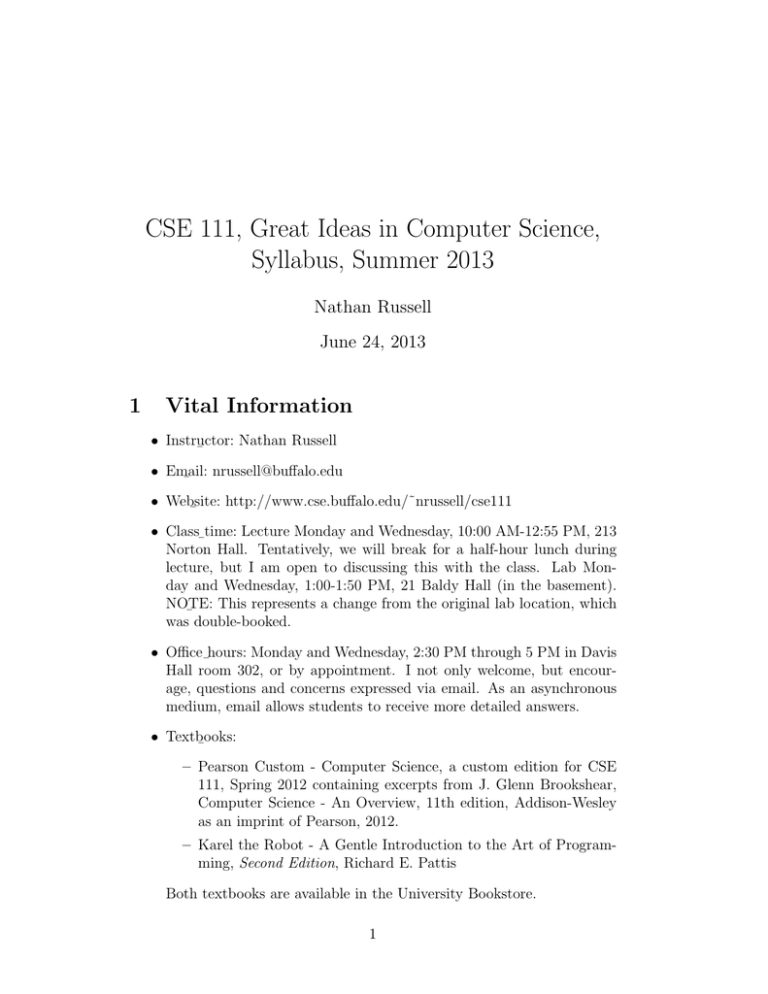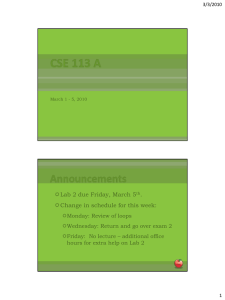CSE 111, Great Ideas in Computer Science, Syllabus, Summer 2013 1 Vital Information
advertisement

CSE 111, Great Ideas in Computer Science, Syllabus, Summer 2013 Nathan Russell June 24, 2013 1 Vital Information • Instructor: Nathan Russell ¯ • Email: nrussell@buffalo.edu ¯ • Website: http://www.cse.buffalo.edu/˜nrussell/cse111 ¯ • Class time: Lecture Monday and Wednesday, 10:00 AM-12:55 PM, 213 ¯ Norton Hall. Tentatively, we will break for a half-hour lunch during lecture, but I am open to discussing this with the class. Lab Monday and Wednesday, 1:00-1:50 PM, 21 Baldy Hall (in the basement). NOTE: This represents a change from the original lab location, which ¯ was double-booked. • Office hours: Monday and Wednesday, 2:30 PM through 5 PM in Davis ¯ Hall room 302, or by appointment. I not only welcome, but encourage, questions and concerns expressed via email. As an asynchronous medium, email allows students to receive more detailed answers. • Textbooks: ¯ – Pearson Custom - Computer Science, a custom edition for CSE 111, Spring 2012 containing excerpts from J. Glenn Brookshear, Computer Science - An Overview, 11th edition, Addison-Wesley as an imprint of Pearson, 2012. – Karel the Robot - A Gentle Introduction to the Art of Programming, Second Edition, Richard E. Pattis Both textbooks are available in the University Bookstore. 1 2 Administration and Students’ Responsibilities Please do not miss class. As this is a 6-week summer session, being absent for one day means you will miss nearly 10% of the content of the course. Note specifically that Wednesday July 3 is a class day. It is intended that help on (graded) homeworks and projects will be given in class; content of future quizzes and exams may also be discussed. This material cannot be made up by reading the textbooks (or posted slides). If time is limited during office hours, priority may be given to students who have attended lecture and lab. If you know you will miss class, notify me as soon as possible via email. In the case of documented illness, athletic obligations, or where otherwise appropriate, makeup quizzes and exams may be given. Under university policy, athletes are required to take responsibility to inform instructors of any scheduling conflicts, ideally as soon as the athlete is aware. Students with a documented disability should also speak to me privately as soon as possible so that accommodation can be given. Students have the responsibility not to commit academic dishonesty, including working together on projects, or submitting the work of others as their own. Under the CSE Department policy on academic honesty, acts of dishonesty will be punished, minimally, with a failing grade in the course. 3 Grading Grades in this course are calculated as follows: • Test 1 (Monday, July 15): 20% • Test 2 (Wednesday, July 31): 30% • Projects: 20% • Quizzes: 20% • Homework: 10% I do not intend to curve grades. You should expect that (for example) 92% is an A-, while 89% is a B+. The second test will cover the entire course, however topics given since test 1 will be emphasized. There will be no final exam per se; test 2 occurs on the last day of class. 2 I anticipate on giving quizzes every two weeks. Homework will be assigned, collected, and graded. Homework should be seen as an opportunity to assess your knowledge before the quizzes and tests. Some quiz/test problems may be adapted from problems given as homework. Homework will be assigned primarily during the early, arithmetic portion of the course. Programming projects will be announced at a later time. There will be two or three programming projects. You should expect that the later projects will be significantly more intricate. 3

